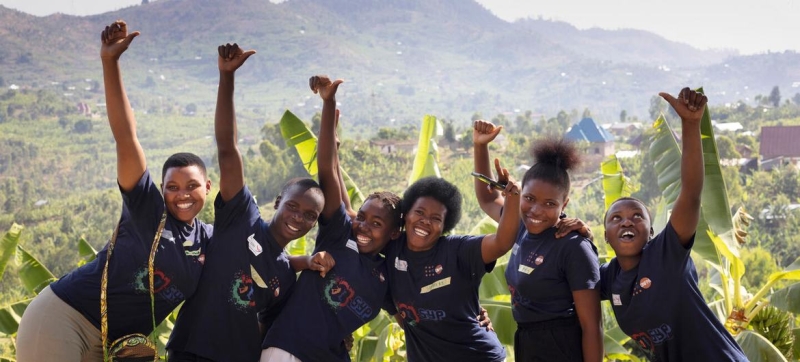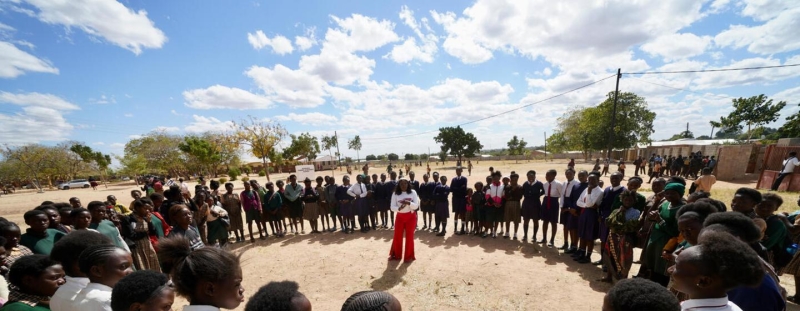
Comprehensive sex education leads to lower rates of teen pregnancy and violence. 10 Myths About Sex Education: Do Kids Need to Know About Sex? Health
Comprehensive sex education leads to lower rates of teen pregnancy, violence, and the spread of sexually transmitted diseases. The goal of such education is to introduce children to the emotional, physical, and social aspects of sexuality and help them prepare for the future. It teaches young people how to build healthy relationships, recognize violence, resist peer pressure, and understand the concept of consent.
Sexuality education has been an integral part of adolescent education for decades. When implemented correctly, it involves trained, experienced educators working with teenagers. Sexuality education is age-appropriate and culturally appropriate. It provides young people with accurate, non-judgmental information, ensuring that they do not have to turn to pornography, hearsay, or unreliable online sources to learn about sexuality.
UNFPA, the UN agency for sexual and reproductive health, works with governments around the world to provide comprehensive sexuality education both in schools and outside of schools through community-based learning.
Of course, in some countries, the idea of sexuality education faces resistance. In recent years, it has become increasingly politicized in national, regional and global contexts. While there is a consensus in many parts of the world that sexuality education can help address a number of serious problems, including teenage pregnancy and gender-based violence, there are growing efforts to sow doubt among parents and caregivers. The rhetoric of opponents of sexuality education remains consistent, although their arguments have little to do with reality. Here are 10 common myths about sexuality education, debunked by UNFPA experts.
1. Myth: Sex education makes children more likely to be victims of sexual abuse.
True:Sex education protects children from violence. It teaches them about threats such as sexual predation, grooming and sexual abuse, and how to seek help.
“Everyone should know that their body is theirs and theirs alone, and that no one else has the right to interfere,” said Rabaa Guesmi, a UNFPA-trained comprehensive sexuality educator in Sousse, Tunisia.
Zandile Simelane, a youth rights activist in Durban, South Africa, told UNFPA that she could have benefited from sex education. She was a teenager when her life was turned upside down. “I was diagnosed with HIV at the age of 17,” she shared.
The news came as a shock to the girl. Zandile’s school didn’t offer sex education, and she knew little about contraception or how to protect herself from predatory adults.
“I know exactly where I got it from – from the ‘blesser,’” Zandile says.
“Blesser” is a term used in her country to describe an older man who “blesses” girls and young women from poor families with mobile phones, money, and other gifts, often in exchange for sex. Since her experience, Zandile has become active in youth organizations, including the UNFPA-supported African Network of Youth and Adolescents. She shares her story to help others avoid similar experiences.

Rabaa Guesmi, sex educator, Tunisia.
2. Myth: Abstinence is more effective than comprehensive sex education.
True:The negative consequences – or at best, the lack of consequences – of abstinence-only teaching teenagers are well documented. It does not reduce rates of teen pregnancy or HIV and other sexually transmitted infections. People who are taught abstinence are less likely to use contraception, are at higher risk of contracting human papillomavirus, and have higher rates of pregnancy outside of marriage.
Thiri, a teenager in Yangon, Myanmar, was taught abstinence. She became pregnant at 15. “My boyfriend and I were in love,” she said. The relationship was very close and warm. But pregnancy changed everything. “I was devastated. I always enjoyed going to school, but when I got pregnant I had to quit,” Thiri says. The couple quickly married, and Thiri moved in with her husband’s parents and gave birth to a baby girl. Her husband graduated from high school and left home to pursue his education. Tiri rarely heard from him, and the marriage fell apart.
Tiri was lucky: her mother stood by her despite the stereotypes and stigma in society. Tiri and her little daughter returned home to her parents, and she now plans to continue her education. Tiri emphasizes that sex education could have helped her avoid pregnancy. “I never learned these things in school or anywhere else,” she says. “Before I got pregnant, I didn’t understand the possible consequences of our love,” Tiri adds.
3. Myth: Sex education encourages children to have sex early or to have more sexual partners.
Truth: Research shows that young people who receive sex education are more likely to have sex later, use contraception, and have fewer sexual partners. Vietnamese Linh Hoang has found an innovative way to spread the word. The founder and CEO of comprehensive sex education platform TeenUp, she helps deliver age-appropriate and culturally appropriate lessons through a mobile app that covers topics like contraception and personal hygiene. By partnering with local schools and educators, she says her project has already reached more than 50,000 children and parents, changing their perceptions and encouraging healthy discussions.
4. Myth: Sex education is against culture and religion.
Truth:Comprehensive sexuality education is tailored to the country or region, taking into account local conditions and traditions, and is delivered with the support of cultural leaders in each community. In Bhutan, for example, UNFPA is working with monks.
“There has been a change in the mindset of monks, who are now free to discuss issues of sexual and gender-based violence, which in the past were considered private,” Lopen Sherab Dorjee of the Central Monastic Corps, one of the first monks to support the initiative, told UNFPA.
Nuns in Bhutan have also been trained and now play an important role in their communities, imparting knowledge to rural women on issues such as menstrual hygiene, contraception and family planning.
In India, an agreement between UNFPA and education officials in the state of Bihar led to traditional Islamic institutions launching an initiative to provide adolescents with age-appropriate information to encourage healthy relationship attitudes and skills to cope with difficult life situations. Jamia Millia Islamia University in New Delhi and Maulana Azad National Urdu University in Hyderabad helped roll out the programme, which has benefited tens of thousands of young people.

Sisters Divya and Sania received information about sexual and reproductive health through a UNFPA project in India.
5. Myth: Sexuality education promotes LGBTQIA+ lifestyles among students.
Truth: Sexuality education does not promote or advocate any particular “lifestyle”; its primary purpose is to ensure the health, well-being, and safety of adolescents. However, sexuality education also recognizes the need to protect the rights of individuals regardless of gender and sexual orientation.
Kyal Sin Htet, an LGBTQIA+ educator in Mon State, Myanmar, faced persistent discrimination and isolation as a child and teenager. “I realized my gender identity when I was just 10 years old,” she told UNFPA.
“When I explored my identity and started wearing my mother’s makeup, the backlash was immediate, both at home and at school,” says Kyal Sin Htet. Her experiences of bullying and harassment shaped her resolve. Kyal Sin Htet works with a local organization that partners with UNFPA to reach out to communities, disseminate information on sexual and reproductive health, and support people on issues related to gender equality and human rights. She does her best to dispel myths and create space for dialogue in the community.
6. Myth: Sex education sexualizes children and takes away their “innocence.”
Truth: Children will face issues related to sexuality at some point, whether we like it or not, so it is vital that they are informed and prepared to deal with them. Comprehensive sexuality education provides them with age-appropriate knowledge and skills that help them avoid pregnancy, understand the concept of consent, make responsible choices, and recognize predation and violence. Such education is often important for members of marginalized communities.
In the Republic of Moldova, Roma youth who fled the war in Ukraine receive sexuality education and services in special “safe spaces” created by UNFPA.
This is the first initiative of its kind for the community. “Services of this kind have not been practiced among this group of the Roma population in Ukraine,” Sahin Raditsa, the program coordinator, told UNFPA, noting that sex education has long been considered a taboo. Sahin is a representative of the Roma community, and, according to him, the initiative provides a balance between the need for information on sexual and reproductive health and the need to respect the traditions and values of the Roma.
“At first, not only parents, but also young people were skeptical about the activities we conducted. But as soon as they saw the effect of these activities, we achieved stable attendance from young people and the full trust of their parents,” Sahin says.
7. Myth: Sex education exposes young people to inappropriate sexual material too early.
Truth: Sex education is age-appropriate and developmentally appropriate. Without it, children and young people are prone to accepting misinformation from their peers, the internet and social media. In Angola, a UNFPA-supported initiative educates young people and prepares them to become advocates for accurate information about sexuality and reproductive health among their peers. “It’s changing lives and empowering young people,” Silvia Francisco, an activist from Luanda, told UNFPA, noting that the initiative is helping to overcome deep-rooted problems in the country.
“It’s been a constant struggle to spread information about sexuality because there are still parents who think that talking to teenagers and young people about it will lead them to have sex,” Francisco said. “But in the program we always talk about safety and the need to delay teenage relationships,” she adds.
In Senegal, 19-year-old Hadi booked her first gynecological examination after attending a comprehensive course on sexuality. “I learned a lot about my health,” she told UNFPA, noting that in her country, young people struggle to find information about sexual and reproductive health.
8. Myth: Sexuality education encourages masturbation.
True: Comprehensive sexuality education does not encourage masturbation. Children begin exploring their bodies at a relatively early age. Educators let them know that this is normal practice. They are trained in how to respond to sensitive questions raised by young people. In sexual education courses, teachers provide factual rather than didactic information.
9. Myth: Comprehensive sex education legitimizes pedophilia.
Truth: Sex education protects children and does not advocate decriminalizing adult behavior with children or lifting the age of consent. Child sexual abuse is a crime, and sex education helps combat it.
Tigist from Ethiopia was raped as a teenager in the home where she worked as a maid. She was fired after she gave birth. To survive and provide for the baby, the girl turned to prostitution. A local NGO that works with UNFPA came to Tigist’s aid. She eventually became an activist and mentor, helping to educate young people.

Sex education lesson in Zambia.
10. Myth: Sexuality has nothing to do with children.
Truth: Sexuality is something that people experience throughout their lives. Sexuality education is a lifelong process and is relevant for all ages. Sex education helps children learn about their bodies, emotions, family life, relationships, basic principles of consent, and what to do if they are exposed to violence or abuse.
“I’ve seen girls get pregnant, abused, infected with HIV, and I don’t want to be one of those girls,” Lydia, a 13-year-old school student in Lusaka, Zambia, told UNFPA. She and her classmates are taking a UNFPA sex education course. Adolescents in Zambia, especially girls, face barriers to sexual and reproductive health due to stigma in society and discrimination from health care providers, which means many do not receive the care and information they need. “I am glad that school taught us how we girls can protect ourselves,” said Lydia.
